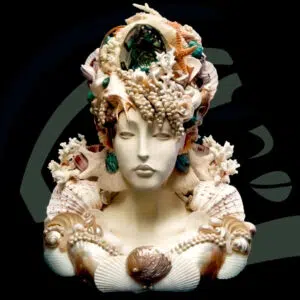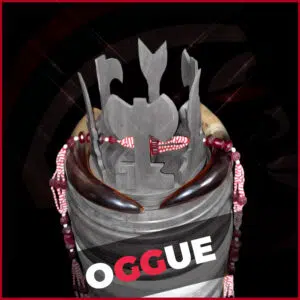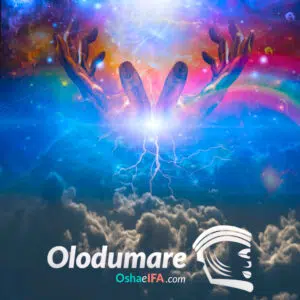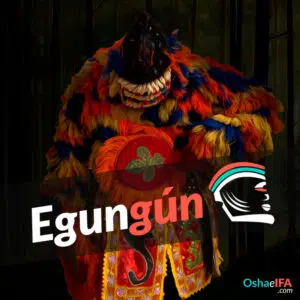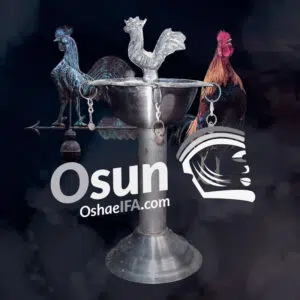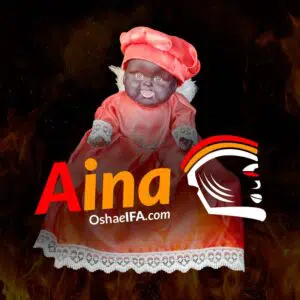Ogbe Ate (Ogbe Irete)

Ogbe Ate (Irete), is the combination between the Ojú Odù Ogbe and Irete and is the 29th Odu of the Ifa genealogy, through the energy of this Odu was that Elegua I arrive at the earthly plane. This sign recommends us to take care of what we say, we should not offend, criticize or get involved in gossip, about this Ifa says that there is no language in the world that Olodumare does not punish.
Analysis and Interpretation of the Ogbe Ate Sign (Ogbe Irete)
Ogbe Ate is an Odu that symbolizes the encounter and conflict between the divine and the human, wisdom and ignorance, health and illness. It is a sign of duality, where light and darkness are in constant interaction. Those born under the influence of this sign must learn to navigate these dualities, balancing their actions and emotions to achieve harmony and avoid falling into misfortune. The presence of Oshún and Ogún reveals the need for balance between the soft and the hard, the flexible and the rigid, teaching the importance of adapting to circumstances without losing the essence.
Economic Aspects
On an economic level, Ogbe Ate suggests that success and prosperity are achievable through hard work, perseverance and ethics. The recommendation to use a metal Ókpuele and receive Orúnmila, Oshún, and Ogún indicates that the protection and blessing of these deities are crucial for economic advancement. However, this Odu warns of the dangers of recklessness and disrespect, remembering that arrogance and disdain for others can lead to ruin. The need for balance in behavior is also reflected in the management of resources, where generosity and prudence must coexist.
"Salud"
Ogbe Ate points out specific concerns in the field of health, particularly related to the brain and craniocerebral system, emphasizing the importance of taking care of mental and physical health. The prohibitions and recommendations offered, such as avoiding sudden movements and attending to Egun, underline the need for caution to prevent diseases and imbalances. The connection between physical and spiritual well-being is evident, reminding followers that maintaining one directly impacts the other.
Religious Aspects
Religiously, Ogbe Irete is rich in symbolism and rituals, highlighting the connection of the individual with Yoruba deities. The Ifá ceremony, the special relationship with Oshún and Ogún, and the presence of Elegba de Caracol, point to the importance of communication and the relationship with the divine. This Odu emphasizes the need to make appropriate sacrifices and follow taboos to maintain Ire (blessing) and avoid Osobo (misfortune), showing that spirituality is not static, but a daily practice of respect and devotion.
Personal Relationships (Love)
In the field of love and personal relationships, Ogbe Ate advises caution and respect. The warning against raising your hand at a woman or disrespecting her highlights the importance of equality and fair treatment within relationships. The story of Oshún and Ogún offers a lesson in patience, understanding, and the need to balance masculine and feminine forces in any relationship. This Ifa sign also warns about the dangers of indiscretion and gossip, underscoring the importance of honesty, communication and mutual respect in building lasting and meaningful relationships.
General Description of Odu Ogbe Irete
This Odu speaks about the birth of crucial entities and concepts within the Yoruba worldview, as well as recommendations, prohibitions and sayings that guide the behavior and destiny of his followers.
Names or Aliases
- Ogbe Irete.
- Ogbe Ate.
- Ogbe Si Lekun Ote.
- Ogbe Re Kuntele.
What is born in the Odu of Ifá Ogbe Ate?
- Oshun: Deity of love, fertility and rivers.
- Plague: It symbolizes diseases and epidemics.
- All the powers of the brain and craniocerebral system: It represents intelligence and mental capacity.
- Abita's mother, Ará Unlá: Origin of an important spiritual entity.
- Ogun Zarabanda: Deity of war and work, manifestation of strength and courage.
- Osuna: Protector of health and well-being, it symbolizes life and security.
- The gonorrhea: Sexually transmitted disease, symbolizes the consequences of irresponsible actions.
- Torture: It reflects suffering and difficult trials.
- The monkey chain: Metaphor of interconnection and dependence.
- The Olokun ceremony, where the spirit of Efe Akaro is called: Ceremony to invoke protection.
Ogbe Irete points out:
- Part of Osanyin's secrets: In-depth knowledge of medicine and herbs.
- St. Vitus's disease: Neurological disease, it symbolizes lack of control and chaos.
- Snail Elegua: Representation of Elegua that emphasizes the importance of divination and protection.
- Obokoyé, the protective shadow of Ogbe-Ate; The father of the shadow is called Obe Ikun. This road is from the Iyesá land.
- Ode: Deity of hunting, symbolizes provision and survival.
- Where Osanyin lives with Shangó: Union of medicine and justice, emphasizes the importance of health and truth.
«He who can do something better than what he does and does not do it, is the greatest of lazy people» It reminds us of the importance of reaching our full potential. It implies that laziness is not only measured in inactivity, but also in the reluctance to fully employ our skills and talents. Refusing to strive for excellence is a form of neglect of oneself and opportunities for growth.
Recommendations of the sign Ogbe Ate (Irete):
- Put a piece of stick in your Ifá Break Ax – To strengthen protection and conflict resolution.
- The Awó of this Ifá must have a metal Ókpuele – This allows Oshún to recognize his dedication to spiritual work.
- Set traps for Elegua and Ogún – To ensure protection and support in their endeavors.
- The Awó of this Ifá must be seen with another Awó when he is sick – Mutual consultation promotes health and well-being.
- Receive Orúnmila, Oshún and Ogún – To avoid legal problems and strengthen your spiritual connection.
- Take care of Elegua – Maintaining a good relationship with Elegua is essential for well-being.
- By Ogbe Irete, do not let anyone sleep in your house – It will avoid problems and misunderstandings.
- Give a fresh fish to your head – For mental clarity and problem solving.
- His wife should moderate her mouth – To prevent conflicts and misunderstandings.
- By Osobo: Do not have chickens lying around your house – To avoid losses and negativity.
- Be careful with your children; have 1 or 2, never 3 – The third could bring difficulties.
- Pay attention to an Egun who is your shadow – For protection and spiritual guidance.
- Put 21 stones in your Ifá – Strengthens the connection with the Ifá oracle.
- Awó Ogbe Ate cannot live with a woman who is the daughter of Oyá – Avoid destructive conflicts.
- Venison (Agbaní) is given to Orúnmila and the head is prayed with the brains. – For wisdom and mental clarity.
Ogbe Ate Prohibitions:
- Do not have empty cages in the house – Avoid the feeling of emptiness and loneliness. Furthermore, it prevents against the attraction of negative judicial energies, symbolizing freedom and plenitude.
- Do not raise your hand to any woman or disrespect her – Promotes respect and harmony in relationships.
- Do not throw stones (especially children and adolescents) – Prevents conflicts and injuries.
- Not hanging out with Mayombe (at least publicly) – To maintain harmony and avoid spiritual conflicts.
You can read: Odu of Ifa Irete Untelu
Ogbe Ate Sayings:
- It is flattened.
- He sees the crown, but does not reach it.
- The comadre buys a new broom.
- The tongue lost its head.
- There is no language, that in life God does not punish.
- As long as the food is not cooked, it is not taken off the fire to eat.
- A working man is rarely in need.
- He who can do better than what he does and does not do, is the greatest of lazy.
- He who has his arms and does not work, is the father of laziness.
«He spots the crown, but he can't reach it» It teaches us about persistence and the importance of recognizing our limitations. This saying suggests that although our goals may seem close, achieving them requires patience, sustained effort, and the wisdom to understand that some goals may be beyond our current reach, urging us to humility and continuous learning.
What does the Ifá Ogbe Ate odu talk about?
- Of justice problem.
- Vehicle accidents.
- Ogbe Irete talks about Iku going in and out of his house.
- That Oshún is impatiently waiting for you.
- That Orúnmila always does something for women.
- Put within Ogún a brake to control children and godchildren.
- To put on a bull leather girdle around your waist to resolve situations.
- In Ogbe Ate Oshún and Ogún met.
- To be careful with women.
- That here Orúnmila was thrown into the river.
- From women's gossip.
- Of contagion and infectious diseases.
- Of brain loss.
- Ogbe Ate talks about a trip and the difficulties in making it because of a woman.
- Raising hand to a woman who wants to rule over men.
- Of problems of anger by women.
- Nothing will happen to you from slander or false testimony that will be raised against you.
- As a stupid child and as a person who is drying up inside his house.
- That his wife wants to leave him and that he must make her a saint.
- Ogbe Ate talks about you destroying your own things.
- That a big scare happened or is going to happen, and that his mouth is hard.
- Of a son who will have to do Ifá before the age of 7 to establish him on Earth and not die.
You can read: Ifa Baba Ejiogbe sign
Says Ifa Ogbe Ate
Be warned that if you fail to serve certain people or entities, you could face legal trouble and even prison, even if you are right. The presence of death lurks within your home.
There is an adversary seeking to confront him because of a woman; Furthermore, he will be falsely accused, but will suffer no consequences. In your home, someone is physically declining, and there is a disobedient young man. His partner wants to leave him, and it is necessary to initiate her into religion, despite his reluctance. You run the risk of sabotaging your own possessions and should be alert to a tall, thin person trying to confuse you. He is known for throwing stones; It is vital that you take care of his Elegua.
It is advisable not to allow other people to sleep in your home to avoid unexpected legal problems due to a sudden death. You have experienced a great scare, you are characterized by your firmness when speaking, and you mention feeling fatigued. It is predicted that he will have a son destined to surpass him in knowledge of Ifá, this being a son of Obatala. At seven years old, he must be initiated into Ifá to preserve his life.
A friend of his has died without receiving the proper funeral honors. In his residence, there is a tied goat that must be offered in a prayer ceremony; Otherwise, three people in his home could go crazy. Although his devotion leans towards Shango, it is essential to respect all deities. To improve his situation, he must offer a large fish to his head. He warns his partner about the consequences of speaking recklessly, since his words can cause serious problems.
If you are interested in driving or if a family member is interested in driving, it is important to proceed with caution. Pigeon pea water can benefit your stomach. Place a horse bit on your Ogun to keep its offspring under control. If your father has passed away, tending to his spirit will provide significant protection. You must maintain constant offerings to Osun and Orunmila to ensure their well-being and protection.
Prayer of the Odu Ogbe Ate:
OGBE ATE MATA ALAMATA, ALAMATA OMO AWOSHE MAFITARUN ADIFAFUN OMA OBANISHE AIKORDIE, ADIE, EKU, EJA, ILA, EFUN, OU, OBATALA OWO MESAN ELEBO.
Ebbo (Works) of the Ogbe Irete sign:
Inshe Osanyin Ogbe Ate:
- 21 strong sticks
- Heads of 2 majeses
- jicotea head
- Hutía head and powdered bones
- a small stone
- Accounts of Saints
- A pumpkin
- 3 peonies
- River sand
- Filings
- Cat head and fangs
- Land of Ceiba
- 3 pigeons
- 7 wonderful peppers
The 3 doves are offered to Egun.
Subsequently, it is recommended to consume bananas, wrapped in black, green and yellow beads. This ebbo also includes pigeon and fish.
Secret of Ogbe Ate:
- a little chain
- A strip of beef leather
- fine hemp
With these three elements a braid is made, which is taken to the bush along with hutía and smoked fish, corojo butter and bee honey, plus the Iyefá of this Odu (Ogbe Irete). There, a stone a little larger than an egg is found and tied to the tip. All the ingredients are placed in the same place, dragging it or calling the name of the Awó and its Ifá name. Then, the stone is brought home and placed inside Ogún for three days.
Work by Ogbe Irete with Oshún:
Oshún is offered five yellow metal instruments, mounted on a crown. Before being washed with omiero, they must be passed over the board.
Iyefá of Ogbe Ate:
- Pumpkin seed powder (Iyé)
- Colorado mamey seed powder
- Cinnamon
- Adimuses offered to Ogún
Herbs (Ewe) of the Odu Ogbe Ate:
- Strenna White
- Purple Bonus
- Hazelnut
- Eucalyptus
- Basil
- Cockroach (plant)
- Orozuz
- Baobab
- Farolito
- Ashibata
This ebbo stands out for its complexity and the richness of natural and symbolic elements used, focused on protection, purification and prosperity, following the teachings of this Odu. Each component has a specific purpose, working together to balance the energies and fulfill the wishes of the one who performs it.
You can read: Everything you need to know about the Orisha Shango
Patakies of the Ogbe Irete sign:
As Ogbe Ate cured the prosperity deity Ola Aje.
Ogbe Ate, known in Heaven as Abaketekete, was an Awó renowned for his ability to heal the deity of prosperity, Ola Aje (known in Yoruba as Ola Aje and in Beni as Uwa), who suffered night attacks from his enemies. transformed into mice. Despite the efforts of numerous celestial Awós, Ola Aje's condition worsened. He had three rooms, each one with mortal dangers and the last one contained immense riches.
The previous Awós failed, choosing the wrong doors and disappearing. When Abaketekete's turn came, he was informed about Ola Aje's illness and consulted Ifá, who recommended him to perform specific sacrifices and prepare a special bath soap. This soap would reveal the identity of the traitors in dreams.
When using the soap, Ola Aje dreamed of his loved ones transforming into mice trying to attack him, but a cat emerging from the soap eliminated them. In the morning, it was discovered that the traitors had mysteriously died. Ola Aje recovered and, as thanks, offered Abaketekete to choose a reward from his treasures.
Eshu, disguised as a young man, advised Abaketekete to avoid the first two doors and choose the third, warning him of the dangers. Abaketekete followed the advice, finding in the third room a crown given by a child. Despite his success, Ola Aje tried to imprison Abaketekete, but after three days, he offered to release him if he could show a ram, a duck and a dove. With the help of Elegua, Abaketekete met the challenge, and Ola Aje freed him with all the riches.
Explanation: This story highlights the importance of prudence, respect for the sacred, and how preparation and faith in spiritual guidance can overcome seemingly insurmountable obstacles, also reminding us of the need to be cautious when extending our kindness so as not to suffer from ingratitude. of others.
They threw Orula into the river
Orula constantly requested offerings from her children to support herself in a war and avoid defeat. One day, exhausted by the continuous requests, Ogbe Ate was reluctant when Orúnmila asked him for a fish, answering with disdain: "If you want a fish, look for it yourself," and immediately throwing it into the river.
This impulsive act was distorted by Eshu, who spread the rumor that Ogbe Irete had thrown something into the river with the intention of poisoning Orúnmila. The accusation reached the ears of the soldiers and, therefore, the king, who ordered the arrest of Ogbe Ate. Imprisoned, he meditated on his actions and, finding 16 stones in his cell, he used them to make a tuffar, asking Orúnmila for forgiveness. The guards informed the king of the divinatory skills of Ogbe Ate, who was summoned to the monarch's presence. There, Ogbe Ate performed an Ifá reading that revealed the king's intimate secrets and suggested an ebó with a broody hen to solve his problems, thus earning him his freedom.
When the king inquired about the reasons for his imprisonment, Ogbe Ate explained that he had been the victim of false testimony. He related how the women, like Babaluaye, bathed in the river, and that the latter washed his sores in its waters. Upon leaving prison, gbe Re Kuntele discovered that Babaluaye had died of old age, and not of witchcraft as had been suggested.
Explanation: The story teaches about the consequences of acting impulsively and how misunderstandings can escalate quickly, leading to false accusations and unfair situations. It highlights the importance of reconciliation and forgiveness, as well as the value of truth and justice to rectify mistakes and overcome adversity. Wisdom and problem-solving skills are crucial to restoring balance and harmony.
Ogbe Ate Ifa Traditional Nigerian
OGBÈ ÌRÈTÈ
Àkùko to ko lánàá
Ìko ire ló ko
A day after Erin
Erin n sunkúun póun ò lólá
Ebo n won ni or se
Àkùko to ko lánàá
Ìko ire ló ko
A day fún Efòn
Efón n sunkún òun ò níyì
Ebo n won ni or se
Àkùko to ko lánàá
Ìko ire ló ko
A day after Esinsin
N lo rèé bá won múle oko àì ródún
Ebo n won ni or se
Àwon métèèta bá rubo
Erin rubo
Efòn náà rubo
Eesin náà rubo
Àwon métèèta bá là
Wón bá bèrè Síí yin àwon Babaláwo
Wón ní Àkùko to ko lánàá
Ìko ire ló ko
A day after Erin
Erin n sunkúun póun ò lólá
Ebo n won ni or se
Erin rubo
Erin lólá
Àkùko to ko lánàá
Ìko ire ló ko
A day fún Efòn
Tí tí nn sunkúun póun ò níyì
Ebo n won ni or se
Kó le baà niyì
Efòn Rbo
efòón níyì
Àkùko to ko lánàá
Ìko ire ló ko
A day fún Esinsin tíí somo ìkéyìín won lenje lenje
Won ní ó rubo kó lè baà toko là wálé
Eesín gbébo nbè
Ó rubo
Eesín wáá toko là wá inú ilé
Erin lólá or
efòn níyì
Eesín nìkàn ló roko
Lóó lá o
Ifá póun pé ire fun eléyìun.
Ifá in Ogbe Ate, says that he refers to a group of three people, three of them will have to combine their efforts to get rich. Ifá says that they are not blood brothers. If this Odù is seen for a person who trades in a foreign city: it is in that city that he will make his money; and if he is a farmer, the farm will make him a rich man.
The rooster that crowed yesterday
His singing is a good omen
Fortune Teller for the Elephant
He cried for having no influence
They told him to make sacrifice
The rooster that crowed yesterday
His singing is a good omen
Guess for the Buffalo
He cried for having no honor
They asked him to make the sacrifice
The rooster that crowed yesterday
His singing is a good omen
Guess for the House Fly
He was going to choose a virgin land at the annual farm
They advised them to offer sacrifice
Three of them observed the prescribed sacrifice
The Elephant made the sacrifice
The Buffalo did too
The house fly was not excluded
Then the three of them got rich
They began to praise their Babaláwos
They said, the rooster that crowed yesterday
His singing is a good omen
Guess for the Elephant
He cried for having no influence
They told him to make the sacrifice
The Elephant made the sacrifice
The Elephant began to have influence
The rooster that crowed yesterday
His singing is a good omen
He made divination for the Buffalo
When I cried for having no honor
They asked him to make the sacrifice
So he would become honorable
The Buffalo offered the sacrifice
The Buffalo made himself honorable
The rooster that crowed yesterday
His singing is a good omen
He made divination for the Housefly the last born of them all
They asked him to offer the sacrifice so that he would come back from the farm a rich person
The housefly heard that it had to make sacrifice
He did it
The house fly from the farm became a rich person
The Elephant is very influential
The Buffalo is honorable
The only house fly was the one that made its way to the farm
To become a rich person
Ifá says, he wishes this person the good fortune of wealth.
Eshu of Ogbe Ate: Laroye Obaranke
For the consecration of Laroye Obaranke, the following are required:
- A Chinese ota
- three snails
- Aikordie
- Ileakan
- Atitan of the four corners
- Earth caught in a whirlwind
- Fine grass
- grass
- Ewe doll
- 13 atare
- Eru
- Obi motiwao
- Orogbo
- Osun
- arid
Additionally, Oshún is offered five farming tools made of yellow metal, mounted on a crown. These tools must be washed with omiero and passed over the board, in a path that highlights how Orunmila always intervenes in favor of women. This act symbolizes the respect and connection between Eshu and Oshún, highlighting the importance of work, fertility and care for the sacred.
If you are interested in the Orishas you can read:

